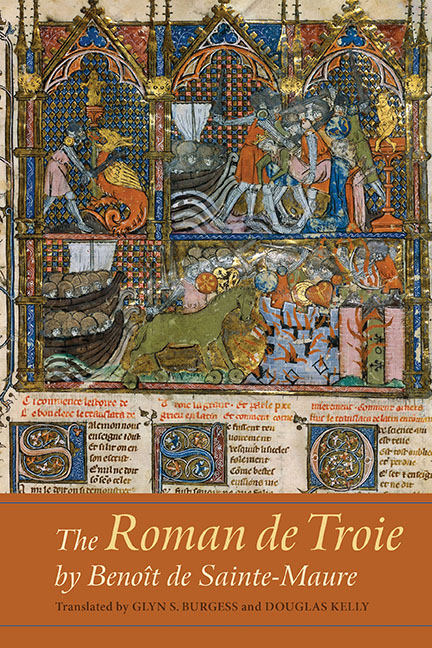Book contents
- Frontmatter
- Contents
- Dedication
- Preface and Acknowledgements
- Introduction
- A Note on the Translation
- Outline of the Roman de Troie
- The Roman De Troie
- Part One Causes and Effects
- Part Two The Trojan War
- Part Three Settling Scores and Surviving
- Appendix I Notes on Some Common Words in the Roman de Troie
- Appendix II Manuscripts of the Roman de Troie
- Bibliography
- Indexes of Personal and Geographical Names
- Index of Personal Names
- Index of Geographical Names
- Miscellaneous Endmatter
Appendix I - Notes on Some Common Words in the Roman de Troie
Published online by Cambridge University Press: 15 February 2018
- Frontmatter
- Contents
- Dedication
- Preface and Acknowledgements
- Introduction
- A Note on the Translation
- Outline of the Roman de Troie
- The Roman De Troie
- Part One Causes and Effects
- Part Two The Trojan War
- Part Three Settling Scores and Surviving
- Appendix I Notes on Some Common Words in the Roman de Troie
- Appendix II Manuscripts of the Roman de Troie
- Bibliography
- Indexes of Personal and Geographical Names
- Index of Personal Names
- Index of Geographical Names
- Miscellaneous Endmatter
Summary
Readers of our translation of the Roman de Troie will have different purposes and differing degrees of acquaintance with the Old French language. This Appendix is aimed at those with access to the original text of the romance, or indeed to other contemporary Old French texts, who wish to be aware of some of the intricacies of Old French vocabulary and who have at least a rudimentary knowledge of Old French. In this section we examine some of the problems that translators of this language encounter. In particular, we wish to take a look at some of the significant Old French terms that are found in the Troie and other contemporary texts and that usually have an apparent equivalent in Modern French and sometimes also in Modern English. These seemingly straightforward words are not always as easy to translate as one might think, as the old and modern meanings are often not the same, or not entirely the same. For example, in addition to the meaning ‘rich’ the very commonly used Old French term riche often means ‘powerful’ or, when describing an object, ‘splendid’. A good translation of a particular example may be ‘rich and powerful’. The present list of terms selected for comment is by no means exhaustive, but it is hoped that it will provide anyone who consults texts from the second half of the twelfth-century with a glimpse of the range of options that are available to the translator. An important aspect of the words studied here is that they often have close links to the feudal world, i.e. to the overall socio-political context of Benoît's work, and also to the courtly world, i.e. to the way in which the aristocracy lived at the time and to the values it embraced. Unless otherwise stated, examples cited here are from the Roman de Troie (Old French spelling varies to such an extent that no effort is made here to include all variant forms of the words studied).
- Type
- Chapter
- Information
- The Roman de Troie by Benoît de Sainte-MaureA Translation, pp. 415 - 431Publisher: Boydell & BrewerPrint publication year: 2017



